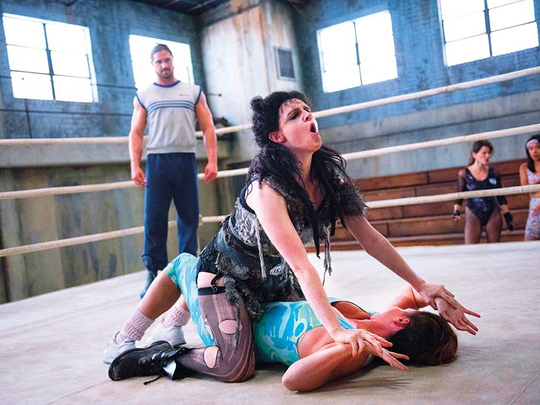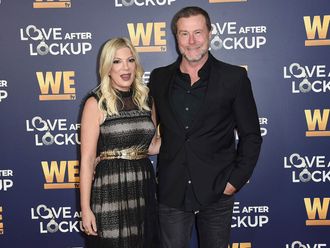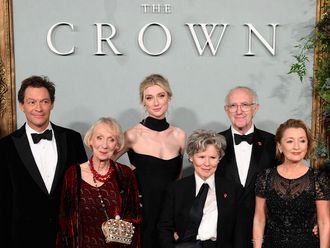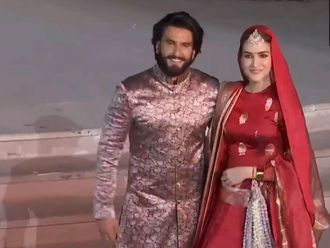
The fun and forthright Glow (premiering on June 23 on Netflix) is a 10-episode dramedy about the nascent days of televised female professional wrestling, in which a disparate group of underemployed actresses, models, party girls and unwitting introverts are recruited by a greaseball B-movie director to try something that’s never been done before. Along the way, they experience the sexist slights and telltale self-discoveries that have come to signify the basic shape of TV’s newfound interest in feminism.
Whether serving time in prison (Orange Is the New Black), angling for a byline (the lamentably cancelled Good Girls Revolt), seeking identity as a newly declared woman (Transparent), challenging outdated ideas of decorum (I Love Dick) or, far more darkly, trying to survive fascist rule (The Handmaid’s Tale), the stories of women on TV these days zero in on the common struggle to simply break through.
In Glow’s case, the goal is to master the physically demanding stagecraft of pro wrestling, with some shred of dignity intact. The women who form Glow — “Gorgeous Ladies of Wrestling,” a real-life 1980s TV sensationon which this show is loosely based — must endure a series of humiliations and reckon with personal compromises. They must also learn to set aside their differences and cooperate to such a degree that, late in the series, they are borrowing tampons from one another because their menstrual cycles have synced. From the wrestling ring, their sisterly empowerment arises.
If you cloaked Glow’s wrestlers in red robes, they could stand in solidarity with Offred and the gang on The Handmaid’s Tale, the Hulu drama that ended its first season a few days ago with a group of handmaids daring, as one, to defy the theocratic government that enslaves them as biblical baby-makers. The refrain is similar, even in these two wildly different shows. Glow’s frivolous but exhilarating note of triumph can be seen as a terrific summertime dessert to The Handmaid’s Tale’s depressing dystopia as well as the prison-riot standoff that preoccupies the latest season of Orange Is the New Black.
But what exactly is the triumph that Glow depicts? The conquering of cheap entertainment? The promise of marginal showbiz wages? The adrenalin rush? Though its characters are tasked with pleasing a male-driven marketplace, Glow seems content to revel mostly in the physical accomplishment. It’s also a kind of birthing story, the creation from scratch of a set of make-believe characters known to wrestling fans as heroes and heels.
Glow is set in 1985 — the most vintage slice of the Reagan era, which is perfectly depicted in all its Dynasty notions of glamour and Jane Fonda workout-tape insistence on self-actualisation. The hair is blown high and mighty like angel wings, and the buns are aerobicized into steel. It opens on starving actress Ruth Wilder (Alison Brie) as she auditions for a role on a TV series and accidentally (or deliberately) reads the rousing monologue meant for the male character instead of the one-line secretary role for which she’s being considered.
Begging an impatient casting director for a lead on any job whatsoever, Ruth is steered toward Sam Sylvia (Marc Maron), a down-on-his-luck film director, whose oeuvre includes such cult bombs as Oedipussy, Swamp Maidens of the Viet Cong and Blood Disco. Sam has been hired by an investor to assemble and train a team of women wrestlers for a new TV enterprise. Sam is turned off by Ruth’s drama-school seriousness, but she is so desperate for work that she persuades him to keep her around while she figures out proper character motivation.
Glow is created by Liz Flahive (an executive producer of Showtime’s Nurse Jackie) and Carly Mensch (also of Nurse Jackie and Weeds); it also includes Jenji Kohan, the creator of both Weeds and Orange Is the New Black, as an executive producer. As such, Glow feels very much of the Kohan school, which celebrates working-class, complicated women whose common trait is an instinct for survival.
The aspiring, if dubious, amateur wrestlers who turn out for Glow include Cherry Bang (Sydelle Noel), a black stuntwoman with limited job opportunities, and Sheila (Gayle Rankin), a young woman who spends her days clad in fur and wearing wolf make-up. Britney Young is especially good as Carmen, a shy woman who turns out to be wrestling royalty — her father is a pro-wrestling star who has forbidden her from joining the sport.
Sam has ideas about creating a convoluted epic about a planet of lesbians, but his investor, a trust-fund kid named Sebastian “Bash” Howard (Chris Lowell), insists that Glow will only be successful if it is consistent with male wrestling’s blunt adherence to conflicts between good and evil and the trash talk that transpires between them, with no nuances of grey. Which is why Sam and Bash assign the other women roles based mostly on racist stereotypes. Jenny (Ellen Wong) becomes “Fortune Cookie”; Tamee (Kia Stevens) becomes “The Welfare Queen”; Arthie (Sunita Mani) becomes “Beirut” and dons a kaffiyeh (“He knows I’m not Muslim, right?” she asks).
It eventually dawns on the women that these characters have the potential to be dangerously offensive, yet Ruth nevertheless pines and pesters Sam to issue her a role, no matter how sexist or degrading. She’s all in.
A solution presents itself when her best friend, Debbie (Nurse Jackie’s Betty Gilpin), discovers that Ruth had a brief affair with her husband (Mad Men’s Rich Sommer) and shows up at the warehouse ready to rumble.
Debbie, a former soap-opera star who recently had her first baby, is filled with such raw aggression that Sam is convinced that he needs her to join Glow. Forgoing her doubts, Debbie signs on — if only to get another few whacks at Ruth. It should come as no surprise that Ruth and Debbie’s irreparably torn friendship is translated into wrestling’s greatest narrative conflict of the day: the Cold War. Brie and Gilpin do terrific work in their roles both in and out of the ring, conveying the outrage and guilt of one woman betraying another.
Glow pulses with all sorts of potential talking points about gender, friendships between women and public perception of stereotypes, but rather than bogging itself down in prolonged messaging, it is consistently committed to a brisk pace and a lightness that reflects its subject matter.
In a way, it’s reminiscent of Penny Marshall’s memorable 1992 film, A League of Their Own, which was about the brief glories of a women’s baseball league during the Second World War. Both are period pieces that capture the prevalence of sexism at different points in American history. Even though Glow is a looser and grittier undertaking, it follows the same basic template, whereby a coach bosses women around without really knowing what the end result will look like and ends up confronting his own misgivings and insecurities about gender. Tom Hanks’s famous admonition from that movie — “There’s no crying in baseball!” - morphs into Glow’s notion that, while an arena full of sceptical men are watching, you bring your tears, anger, resentment and anything else you’ve got into that ring with you. It all proves useful.
Don’t miss it
Glow (10 episodes) is available from June 23, on Netflix.













